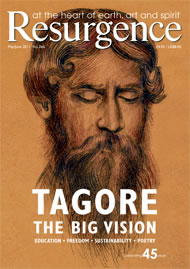The publication of a new and expanded edition of a selection of poems by Rabindranath Tagore, I Won’t Let You Go, translated into English by Ketaki Kushari Dyson, is a cause for celebration. Tagore is among the greatest poets of modern times and widely recognised as a brilliant, creative genius produced by the Indian Renaissance.
As the first non-European to win the Nobel Prize in Literature, in 1913, his work has been known to readers worldwide; yet a lack of suitable translations has made the task of appreciating Tagore’s remarkable poetic genius difficult. In her Preface to the new edition, Dyson acknowledges her debt to
Professor Nemaisadhan Bose, who, when he was Vice Chancellor of Visva-Bharati, persuaded her to undertake the project of translating Tagore.
In a comprehensive Introduction to the first edition, first published in 1991, and in the Notes to the poems, Dyson provides a wealth of biographical, historical and intellectual background to Tagore’s writings – including insights into his personal life and his views about the nation-state, the class system and the status of women, as well as the nature of his faith.
Tagore was not a systematic philosopher, but he was of considerable contemporary relevance as a thinker. And Dyson places his achievements in the context of India’s “rich, three-dimensional, historical realities” while pointing the reader to his personal vision of the interconnectedness of the universe.
Dyson captures successfully the pulse of Tagore’s poetry. As the London Review of Books observes, “Ketaki Kushari Dyson’s selection I Won’t Let You Go perhaps captures more successfully than any other the sensuous Bengaliness of Tagore’s works, and the particularity of the weather, both inner and outer, in which the poems exist.” The selection of poems aims to bring out the strength – the variety of themes, the richness of language – of Tagore’s poetry, which is “characterised by an impressive wholeness of attitude: a loving warmth, a compassionate humanity, a delicate sensuousness, an intense sense of kinship with Nature, a burning awareness of the universe of which we are a part”.
Tagore’s transcendent yet passionately human vision comes across forcefully in his poems. In his poem, Earth, he writes: “Deep is my desire | in country after country to identify | myself with all men… | … | Oh, to be a naked barbarian, sturdy, robust, fierce, | neither to duties nor to prohibitions geared, | bound by nothing – neither customs, nor scruples, nor doubts, | nor a sense of mine and thine, nor the fever of thought; | one whose life-flow always rushes unchecked…” The strength of such a point of view is its open-endedness; he is Everyman and more. This sense of the individual Self spilling out to embrace the universal Self reminds us of the Romantic poets in Europe and the American
Transcendentalists, as much as the classical Indian poets.
The Earth is a mother whose hands hold not ‘infinite riches’ but ‘unfinished pleasures’ (On Her Powerlessness). She “clings to all her offspring, saying ‘I won’t let you go’ to the tiniest blade of grass that springs from her womb, and she is as powerless to prevent their departure as Tagore’s young daughter is to prevent her father’s going away to his place of work,” explains Dyson.
It is not possible in a short review to accommodate the multi-faceted treasury of Tagore’s writing – he was a brilliant love poet, a poet who wrote about loss and bereavement that sprang from his personal experiences; he was a poet with a keen insight into the psychology of children, and he empathised deeply with the oppressed and with those less fortunate than himself.
Many philosophical and religious strands go into the making of Tagore’s world. He absorbed myriad influences and integrated them into his personal vision; his poetry, however, remains ‘without labels’, recording his spiritual journey that enriches others who can share the effortless ease with which he moves from a tiny detail to the vast cosmos. Tagore was prophetic when he wrote: “A hundred years from today | who are you, sitting, reading a poem of mine, | under curiosity’s sway – | a hundred years from today?” A hundred years from now there will still be many reading his work, admiring the man and the culture that nourished such a flowering.






